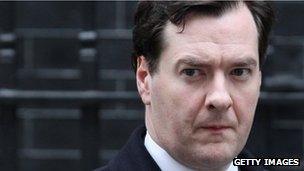George Osborne says eurozone crisis killing UK recovery
- Published
- comments

Mr Osborne said banking union was a "natural extension" of the euro
The UK's hopes of economic recovery are being "killed off" by the eurozone crisis, the chancellor has warned.
Writing in the Sunday Telegraph, George Osborne said European leaders faced a "moment of truth" which could determine the economic future for over a decade.
He added that British businesses were "being held back because of uncertainty about the future".
But Labour's Ed Balls said Mr Osborne was making "desperate excuses" for the government's failure to deliver growth.
And Conservative MP Douglas Carswell said Mr Osborne's analysis was "misplaced".
BBC deputy political editor James Landale says Mr Osborne has spoken before about the negative impact of the eurozone crisis but never in such stark language - or with such pessimism about the UK's future recovery.
Revised figures last month revealed the UK economy shrank by 0.3% in the first three months of the year, while in the final three months of last year the economy also shrank by 0.3% - putting the UK back in recession.
The government says the single market is a key driver for economic growth in the UK and in Europe.
The Department for Business Innovation and Skills says the eurozone may be responsible for income gains in the UK of between 2% and 6% - which would add around £1,100 and £3,300 a year to each household.
It says European markets account for half of the UK's overall trade and foreign investments and that around 3.5 million jobs in the UK are linked to the export of goods and services to the European Union as a whole.
<link> <caption>The newspaper article</caption> <url href="http://www.telegraph.co.uk/news/politics/9320913/We-will-not-prop-up-Europes-banks.html#" platform="highweb"/> </link> comes in the wake of an announcement that Spain will get up to 100bn euros ($125bn; £80bn) in loans from eurozone funds to shore up its struggling banks.
The move was agreed during emergency talks between eurozone finance ministers on Saturday.
The International Monetary Fund (IMF) said the bailout was big enough to restore credibility to Spain's banks.
Mr Osborne wrote that the lesson of the last two years was that treating the "latest symptom" would not be enough to "cure the underlying conditions".
He added: "Our recovery - already facing powerful headwinds from high oil prices and the debt burden left behind by the boom years - is being killed off by the crisis on our doorstep."
The chancellor continued: "The British government is clear that it is strongly in Britain's interests for our biggest export market to succeed; the risks for us of a disorderly outcome are huge."
He said decisive action was needed to end the instability as "we are approaching a moment of truth for the eurozone".
"After more than two years of uncertainty, instability and slow growth, decisions taken over the next few months could determine the economic future of the whole European continent for the next decade and beyond."
'Choked off'
Mr Balls said it was "deeply complacent and out of touch" to blame the eurozone for a "double-dip recession made in Downing Street".
The shadow chancellor added: "Despite the eurozone crisis, Germany, France and the euro area as a whole have so far avoided recession while Britain's recovery was choked off in the autumn of 2010."
He said what was needed was a plan for jobs and growth, in Britain and in the eurozone, to get people back to work and get deficits down.
"If we fail to act now, we will pay a very heavy long term price," he said.
Mr Carswell also took issue with Mr Osborne, accusing him of "Gordon Brown-era Whitehall thinking",
"The idea that it is all the fault of the eurozone is demonstrably wrong," he wrote <link> <caption>on his blog</caption> <url href="http://www.talkcarswell.com/" platform="highweb"/> </link> .
"It is not the eurozone crisis that we should blame for our awful economic performance, but the almost total absence of domestic economic reform, coupled with the Treasury's absurd belief that monetary stimulus can engineer growth."